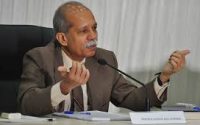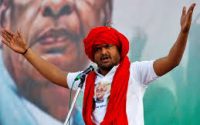Court Sentence: Tortuous Path to Justice
Source:indialegallive.com
Justice must not only be done but also seen to be done, or so goes an old saying. In this case it was finally seen to be done, nine days short of a nine-year-long epic battle. When the special CBI court in Ahmedabad sentenced a former BJP MP from Junagadh, Dinu Bogha Solanki, and six others, including his nephew and a police constable, life came full circle for a grieving but determined father who fought indomitable odds to secure justice for the murder of his son, RTI activist Amit Jethva. The father, Bhikhubhai, said: “The conviction is a victory for the judiciary and exemplary proof that a judicial system exists which is reassuring for commoners.” The verdict is perhaps the first time in the history of Gujarat that a former MP has been held guilty of murder. All seven accused were sentenced to life imprisonment by special CBI judge KM Dave on July 11.
Jethva, who had taken on powerful people indulging in illegal mining in and around the lion sanctuary of Sasan Gir in Gujarat, was shot dead outside the Gujarat High Court premises on July 20, 2010. The killing came within a fortnight of his filing an RTI on the issue and was done at point-blank range when Jethva had gone to see his lawyer. What followed was a tortuous journey for those demanding justice and a prime example of how a skewered system works in favour of the rich and powerful, part of the country’s administering structure, while illegally milking it in flagrant disregard of the law.
Jethva was targeted because he had, through a series of RTI queries, exposed illegal mining carried out by the then sitting BJP MP, Solanki, within the five-km periphery of the world’s only sanctuary for Asiatic lions in Sasan Gir. Failing to get a response from the BJP-ruled state government, Jethva appealed to the Gujarat High Court and, days later, paid with his life. Solanki was then a man whose writ ruled over the region and with connections to the very top of the state government. He flaunted his opulent lifestyle and, according to one story, even owned an air-conditioned tractor. What is known is that using a familiar combination of money and muscle, he was seen as invincible. Proof lay in the fact that despite the national outcry over the murder, successive police investigations gave a clean chit to the MP. On July 24, 2010, investigations were transferred from the Ahmedabad police to the crime branch, but barely a month later, the investigating officer also cleared Solanki of any wrongdoing.
The matter was back before the High Court which handed over the investigation to the CBI on September 25 even as it rejected the state government’s plea for a stay on the order. It had harsh words to say: “So many people, whose vested interests may have been affected by his applications under the RTI Act, could have a motive to contribute to his killing. Therefore, a perfunctory investigation on the basis of statements of the accused persons themselves may not unearth the whole truth and meet the ends of justice. It is imperative that proper and comprehensive investigation is undertaken by an agency which is not under the control of the state government. The murder of a petitioner in a PIL and an RTI activist, in front of the High Court, in the facts of the present case, amounted to an affront to the judicial system and a challenge to implementation of an Act of Parliament, with national repercussions and has to be viewed seriously. Therefore, it is of utmost importance that the case on hand is thoroughly investigated and properly prosecuted by independent and competent officers, so as to inspire confidence and reaffirm faith in the rule of law.”
That was reflected in the numerous twists and turns in the case with a tenacious father, Bhikhubhai, fighting spiritedly, backed by a small, resolute band of activists and a High Court determined to do justice. At one point, Bhikhubhai moved the High Court seeking re-trial on the ground that 105 of the total 195 witnesses had turned hostile under pressure from the BJP leader. By then, the trial had already concluded. In one incident, a scared witness under cross-examination jumped out of the witness box and ran away after he was told that his son had gone missing. The High Court ordered a retrial. The case reached the Supreme Court which restricted it to examining 27 witnesses afresh, including 18 eyewitnesses. The High Court also transferred the case to special CBI judge KM Dave though the trend of witnesses turning hostile continued. By one count, the number stood at 155, including those who were reexamined.
Once the CBI took charge, investigations gathered pace. Solanki was arrested on November 5, 2013, and on December 21, 2013, the CBI filed a charge sheet against him. On February 25, 2014, the Supreme Court granted him bail. According to special prosecutor Mukesh Kapadia, the testimony of Rama Haja, Solanki’s driver for 18 years, was crucial to the conviction. Haja was moved by the CBI to Delhi and his statement recorded under Section 164, CrPC. He was an eyewitness to the entire sequence of events—the planning of the murder, the involvement and role of each of the co-accused including the policeman and the hiring of paid killers. He also helped locate a crucial piece of evidence—he testified that Solanki received a call on his mobile informing him that the job of killing Jethva had been completed. The mobile had gone missing but Haja showed the CBI the place where the mobile had been buried, and call data records nailed the strongman.
Bhikhubhai was supported in no small measure by lawyer-activist Anand Yagnik. “We filed 35 petitions before the High Court in our pursuit of justice. These were powerful people who had the best legal brains working for them but ours was a fight for justice,” said the lawyer who himself testified before the courts that Jethva had spoken of a threat to his life from Solanki. Yagnik was the legal brain behind Jethva’s original crusade. He was supported by Mahesh Makwana, also an RTI activist and a close associate of Jethva in the battle against the illegal mining mafia. The Dalit activist was even assaulted by goons in 2016. “There are nearly 50 criminal complaints filed against Solanki and his family members and accomplices but the cops go through the rigmarole of filing reports and exonerating them,” he said, adding that he will continue the crusade taken up by his late friend.
At one point, Bhikhubhai had sought police protection for the judge hearing the case. The judgment was delivered amidst tight security and in-camera. Those held guilty of murder, criminal conspiracy and violations of the Arms Act include, besides Solanki, his nephew, Pratap alias Shiva Solanki, Pachan Desai, police constable Bahadursinh Vadher, sharp shooters Shailesh Pandya, Sanjay Chauhan and Udhaji Thakore. Bhikhubhai understands well that this may be a mere punctuation mark in a continuing battle against both the illegal mining mafia and the legal battle he is fighting, but he is determined to carry it to its logical end, having already earned a famous victory. As he said: “My son can now finally rest in peace for he has got justice after a very long struggle.”



